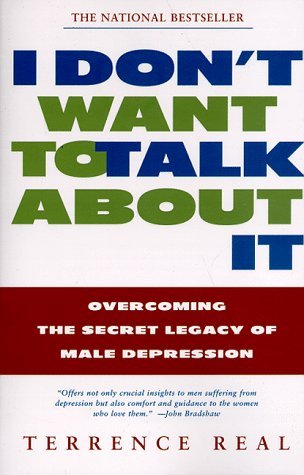More on this book
Community
Kindle Notes & Highlights
Read between
September 5 - September 5, 2020
One of the ironies about men’s depression is that the very forces that help create it keep us from seeing it. Men are not supposed to be vulnerable. Pain is something we are to rise above.
We tend not to recognize depression in men because the disorder itself is seen as unmanly.
Studies indicate that from the moment of birth, boys are spoken to less than girls, comforted less, nurtured less. Passive trauma in boys is rarely extreme; it is however, pervasive.
The danger lay in Dave’s becoming so intent on protecting his son from the kind of abuse from which he had suffered that he would end up, ironically, doing him harm. This is a common dynamic between father and son.
The typical American father spends on average only eleven minutes a day with his children.
The losses repeat like a time-released capsule, as the boy learns to reject help and comfort over and over again throughout his childhood, and, indeed, throughout his lifetime. By internalizing the value of invulnerability and the devaluation of dependency, boys like Frank learn to reject comfort and connection in an ongoing manner.
It isn’t that men have fewer relational needs than women, but that they have been conditioned to filter those needs through the screen of achievement.
Josh’s father is to Josh at that moment what Willy Loman was to Biff, what David Ingles was to Chad. Over the years, countless troubled Joshes and Chads have crossed into my office—slouching, “underachieving” boys whose parents are at their wits’ end. I often frame them in my mind as little protesters, sit-down strikers refusing to march off into the state of alienation we call manhood. If the choice is between success and connection, many boys simply refuse to play. We usually call these boys delinquents.
Fathers, or even school counselors, will often say of a boy’s acting-out behavior, “We think he’s just looking for attention.” To which I say, “Right! For God’s sake let’s give him some! And let’s try our best to make it the kind he most needs.”
The aversion of many men to strong emotion, Gottman speculates, may not be the result of a diminished capacity to feel, as has been commonly believed, but just the reverse. Because men may bring a heightened biological sensitivity to the experience of feeling, strong emotion might be experienced as aversive, as physiologically overwhelming.
Work with depressed men and their partners has convinced me that men’s much-vaunted fear of women and of intimacy is really not a fear of either. What men fear is subjugation. In the one up/one down, better than/less than, hierarchical world of traditional masculinity, one is either in control or controlled. Vulnerability, openness, yielding to another’s wishes—many of the requisite skills for healthy relationships—can be experienced by men as invitations to be attacked. Men’s fear of entrapment, of female engulfment, is not really about women at all. It is a transposition of a male model of
...more


